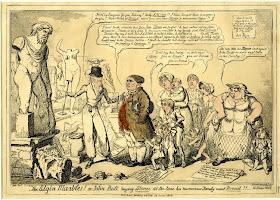 So the lawyer Amal Alamuddin is to advise Greek PM Antonis Samaras on recovering the
Parthenon marbles. I am interested in the
Earls of Elgin because they live in Broomhall House, Fife, Scotland, near my
parents. Reclusive, reactionary, Etonian, a leading freemason—the current, ninety-year-old 11th Lord Elgin
(aka Andrew Bruce) still has a few bits of the Parthenon secreted at Broomhall.
I feel Alamuddin should know.
So the lawyer Amal Alamuddin is to advise Greek PM Antonis Samaras on recovering the
Parthenon marbles. I am interested in the
Earls of Elgin because they live in Broomhall House, Fife, Scotland, near my
parents. Reclusive, reactionary, Etonian, a leading freemason—the current, ninety-year-old 11th Lord Elgin
(aka Andrew Bruce) still has a few bits of the Parthenon secreted at Broomhall.
I feel Alamuddin should know. |
| Andrew Bruce, the Current Lord Elgin (the one with a pink face) |
It
was Thomas Bruce, 7th Earl Elgin, who brought the marbles to Britain.
He had a reasonable fortune from the labours of industrial workers on the
Broomhall estates (in lime kilns, coal mines, iron foundries). But he was
ambitious to become nationally famous. The plan to abduct half of the acropolis
developed when he married the richest heiress in Scotland and felt financially
equipped to turn his ancestral seat into the flashiest Greek revival building
in existence.
 |
| Lime Kilns Owned by 7th Lord Elgin |
 |
| Perth Sheriff Court's Doric Portico |
Cruikshank
depicts the Leader of the House of Commons, Lord Castlereagh, as a sinister
salesman trying to entice John Bull, the archetypal sensible Briton, to buy
some broken statues. Castlereagh says, ‘Here's a Bargain for you Johnny! Only
£35,000!! I have bought them on purpose for you! Never think of Bread when you
can have Stones so wonderous Cheap!!’
Bull,
in patched clothes, is surrounded by his emaciated children. Mrs. Bull’s baby
is sucking a meatless bone. Other children shout ‘Don't buy them Daddy! we
don't want Stones. Give us Bread! Give us Bread! Give us Bread!’
 |
| Broomhall; still houses some bits of the acropolis |
Cold is the heart,
fair Greece! that looks on thee,
Nor feels as lovers o’er the dust they loved;
Dull is the eye that will not weep to see
Thy walls defaced, thy mouldering shrines removed
By British hands, which it had best behoved
To guard those relics ne’er to be restored.
Curst be the hour when from their isle they roved,
And once again thy hapless bosom gored,
And snatched thy shrinking gods to northern climes abhorr’d!
Nor feels as lovers o’er the dust they loved;
Dull is the eye that will not weep to see
Thy walls defaced, thy mouldering shrines removed
By British hands, which it had best behoved
To guard those relics ne’er to be restored.
Curst be the hour when from their isle they roved,
And once again thy hapless bosom gored,
And snatched thy shrinking gods to northern climes abhorr’d!

No comments:
Post a Comment